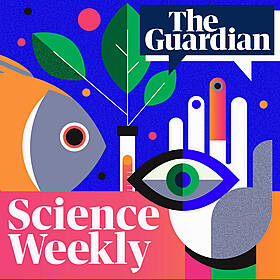
What a dark energy discovery means for the fate of the universe
20 March - 16 minsDark energy, the mysterious force powering the expansion of the universe, appears to be weakening over time, according to a major cosmological survey that has thrown the laws of modern physics into doubt. Ian Sample tells Madeleine Finlay how this new finding could shed light on the ultimate fate of the cosmos, and Saul Perlmutter, who won a Nobel prize for his work proving the universe is expanding, describes how the new development could upend assumptions about how this mysterious force operates. Help support our independent journalism at theguardian.com/sciencepod

‘Parasites should get more fame’: the nominees for world’s finest invertebrate
Invertebrates don’t get the attention lavished on cute pets or apex predators, but these unsung heroes are some of the most impressive and resilient creatures on the planet. So when the Guardian opened its poll to find the world’s finest invertebrate, readers got in touch in their droves. A dazzling array of nominations have flown in for insects, arachnids, snails, crustaceans, corals and many more obscure creatures. Patrick Barkham tells Madeleine Finlay why these tiny creatures deserve more recognition, and three readers, Sandy, Nina and Russell, make the case for their favourites.. Help support our independent journalism at theguardian.com/sciencepod
18 mins
3 April Finished

Keto: what’s the science behind the diet?
While other diet fads come and go, the ultra low carbohydrate Keto diet seems to endure. But as scientists begin to understand how the diet works, more is also being discovered about its risks. To find out more, Madeleine Finlay speaks to Javier Gonzalez, professor in the department of health at the University of Bath, with a special interest in personal nutrition. He explains how the diet works, what it could be doing to our bodies and what could really be behind the weight loss people experience while on it. Help support our independent journalism at theguardian.com/sciencepod
17 mins
1 April Finished

The rise and fall of DNA testing company 23andMe
The genetic testing firm 23andMe has filed for bankruptcy, another twist in the story of a company that promised a pioneering approach to precision health. Now users are scrambling to delete their personal data, with the future ownership of the firm uncertain. To understand the highs and lows of 23andMe’s journey, Madeleine Finlay hears from the Guardian US tech reporter and editor Johana Bhuiyan, and from Timothy Caulfield, a professor of law at the University of Alberta, who has a special interest in health and biotechnology. Help support our independent journalism at theguardian.com/sciencepod
21 mins
27 March Finished

Where do our early childhood memories go?
It’s a mystery that has long puzzled researchers. Why can’t we remember our early childhood experiences? Freud called the phenomenon infantile amnesia, and for many years scientists have wondered whether it’s a result of failure to create memories or just a failure to retrieve them. Now new research appears to point to an answer. To find out more, Ian Sample talks to Nick Turk-Browne, a professor of psychology at Yale University.. Help support our independent journalism at theguardian.com/sciencepod
18 mins
25 March Finished

A mysterious millionaire and the quest to live under the sea – podcast
Before billionaires dreamed of setting up communities on Mars, the ocean was seen as the next frontier in human habitation. Reviving this dream is Deep, a project backed by an anonymous millionaire to the tune of more than £100m that aims to establish a ‘permanent human presence’ under the sea from 2027. Guardian Seascape editor Lisa Bachelor visited the project just outside Chepstow on the Welsh border, and tells Madeleine Finlay what scientists hope to learn about the ocean by spending extended periods living underwater. Help support our independent journalism at theguardian.com/sciencepod
16 mins
18 March Finished





















